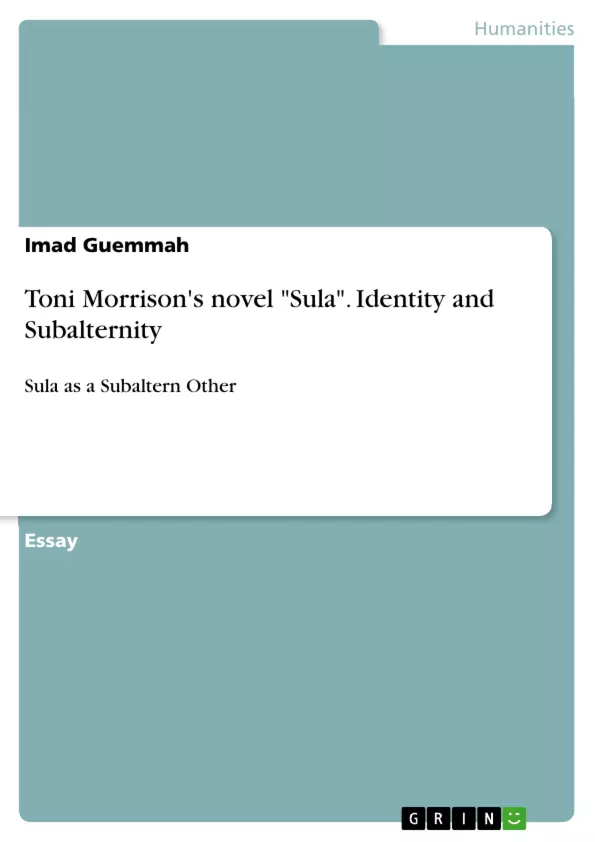This paper approaches an exploration of two major themes in Sula: social identity and gender subalternity. I would begin with a general presentation of the major points that mark this Oscar-winning novel, and then shift to violently serious disagreements that bear reference to the submissive, subaltern position that Sula, on behalf of every woman of color, has to embrace. As the novel, as well as a bundle of essays and articles explain, the protagonist is weary of all that binds her to submission, and has thus decided to follow her own way of life. The analysis is held from a Postmodern perspective. I would therefore attempt to build a bridge between the discourse of Morrison, who is addressing her message in the name of Sula, and that of postmodernism, which is a deviation from representation and a turn towards self-reflexiveness. I am eventually describing the societal tension between Sula and her fellow denizens, who are caught up in an arena of contest the ground of which is experience and circumstances.
Table of Contents
- On Sula's Identity and Subalternity
- Sula as a Subaltern Other
Objectives and Key Themes
This paper aims to explore two prominent themes in Toni Morrison's novel Sula: social identity and gender subalternity. It examines how Sula, as a woman of color, navigates a society that marginalizes her and pushes her towards submission. The analysis draws on a postmodern lens, emphasizing the novel's self-reflexivity and deviation from traditional representational approaches.
- Postmodern interpretation of Toni Morrison's Sula
- Sula's defiance of social expectations and submission
- The impact of gender subalternity on Sula's identity
- The role of language in shaping power dynamics
- The challenges of representation and the rejection of universal truths
Chapter Summaries
The paper begins by introducing Sula as an autonomous figure who resists societal pressures. The author highlights Sula's complex psychological state and Morrison's postmodern approach to exploring themes of culture, gender, body, and emotion. The text then delves into postmodern philosophy, explaining how it rejects traditional notions of truth and objectivity, creating a space for feminist discourse. The paper further explores the concept of subalternity and the historical dominance of elite groups in shaping narratives and power structures. It discusses the role of language in maintaining these power dynamics, citing Lyotard's "Language Game" theory. The analysis then challenges the validity of universal truths, questioning the legitimacy of those who create rules and dictate social norms. Finally, the paper emphasizes the importance of language in constructing reality, arguing that language shapes and distorts our understanding of the world. It concludes by discussing the complexities of self-identity and the implausibility of a fixed "Self," highlighting how Sula embodies Morrison's exploration of these concepts.
Keywords
The primary focus of the paper lies in analyzing the concepts of subalternity, submission, experience, and social identity in Toni Morrison's Sula through a postmodern lens. The analysis explores the intersection of gender and race, highlighting the challenges faced by women of color within a patriarchal society. Key concepts such as representation, power dynamics, and the limitations of language are also explored. The paper further examines feminist theory and its engagement with postmodern philosophy.
Frequently Asked Questions
What are the main themes of Toni Morrison's novel "Sula"?
The novel primarily explores social identity, gender subalternity, and the defiance of societal norms by women of color.
How is "Sula" interpreted from a postmodern perspective?
The analysis focuses on self-reflexivity, the deviation from traditional representation, and the rejection of universal truths.
What does "subalternity" mean in the context of this novel?
It refers to the marginalized and submissive position that Sula is expected to embrace as a woman of color within a patriarchal society.
How does language shape power dynamics in the story?
Drawing on Lyotard's "Language Game," the paper argues that language is used to construct reality and maintain dominant power structures.
Why does Sula resist societal pressures?
Sula seeks autonomy and decides to follow her own way of life, rejecting the psychological and social submission demanded by her community.
- Citation du texte
- Imad Guemmah (Auteur), 2011, Toni Morrison's novel "Sula". Identity and Subalternity, Munich, GRIN Verlag, https://www.grin.com/document/274801



